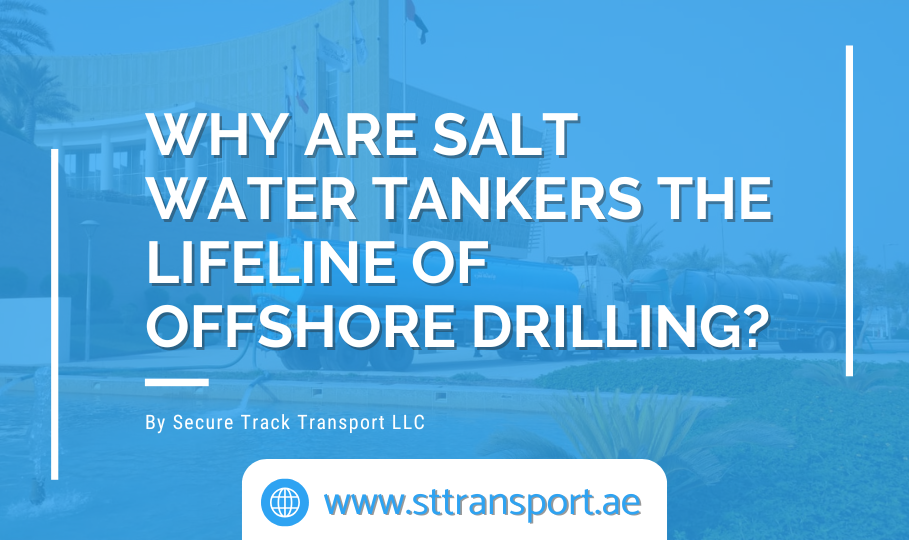Offshore drilling, the process of extracting oil and gas from beneath the ocean floor, is no small feat. These operations occur in some of the most challenging environments on the planet, requiring robust logistics and resources to succeed. Among these critical resources, salt water tankers play an indispensable role. Acting as the lifeblood of offshore drilling, these specialized vessels ensure the continuous supply of salt water needed to sustain complex drilling processes.
What Are Salt Water Tankers?
Salt water tankers are specialized vessels designed to transport large volumes of salt water to offshore drilling sites. Unlike traditional water carriers, these tankers are equipped to handle the unique challenges of transporting and supplying water in marine environments.
Types of Salt Water Tankers
- Large Bulk Tankers: Designed for high-capacity transport to support extensive drilling operations.
- Multipurpose Vessels: Adaptable for carrying other supplies alongside salt water.
- Specialized Tankers: Equipped with advanced filtration and pumping systems for precise delivery.
The Role of Salt Water in Offshore Drilling
Salt water is a cornerstone of offshore drilling for several reasons. It serves as a key component in drilling mud, a fluid mixture used to cool drilling equipment, stabilize wellbores, and carry cuttings to the surface. Additionally, salt water is readily available in marine environments, making it a practical and cost-effective resource.
Functions of Salt Water in Drilling Operations
- Drilling Fluid Preparation: Mixing salt water with other chemicals to create drilling mud.
- Cooling Systems: Keeping equipment at optimal temperatures during operation.
- Well Pressure Control: Stabilizing the pressure within the wellbore.
The Challenges of Offshore Drilling Operations
Offshore drilling sites are often located in remote areas, far from onshore facilities. These sites face harsh weather conditions, logistical hurdles, and the constant threat of equipment failures. Ensuring a steady supply of resources like salt water is critical to overcoming these challenges and maintaining efficient operations.
Why Salt Water Tankers Are Essential
Salt water tankers bridge the gap between offshore drilling rigs and the vast quantities of water required for operations. Without these vessels, maintaining a consistent and reliable water supply would be nearly impossible, leading to operational delays and increased costs.
Core Features of Salt Water Tankers
Salt water tankers are engineered for durability and efficiency in the demanding offshore environment.
- High-Capacity Storage Tanks
These tankers can carry thousands of gallons of water, ensuring that drilling sites remain well-stocked. - Advanced Pumping Systems
High-powered pumps allow for precise delivery of salt water to drilling platforms, even in rough seas. - Filtration Technology
Some tankers are equipped with filtration systems to remove impurities, ensuring the water meets operational standards.
How Salt Water Tankers Enable Sustainable Operations
In an era where sustainability is a priority, salt water tankers supply play a pivotal role in reducing freshwater consumption. By relying on seawater, offshore drilling operations can minimize their impact on freshwater ecosystems, contributing to more eco-friendly practices.
Safety Measures in Salt Water Tanker Operations
Safety is paramount in the operation of salt water tankers. From adhering to maritime safety regulations to performing regular maintenance, these vessels are operated with stringent protocols to ensure the well-being of both the crew and the environment.
Advantages of Using Salt Water Tankers
Salt water tankers offer several benefits that make them indispensable to offshore drilling:
- Cost-Efficiency: Transporting seawater is more economical than sourcing and shipping freshwater.
- Scalability: Tankers can adapt to the demands of both small-scale and large-scale drilling operations.
Key Players in the Salt Water Tanker Industry
Leading companies like Maersk, Schlumberger, and Tidewater have invested heavily in the development of advanced salt water tankers. These industry giants continue to push the boundaries of what these vessels can achieve, incorporating cutting-edge technology into their designs.
Real-World Applications in Offshore Drilling
Case studies from major drilling operations highlight the critical role salt water tankers play in maintaining efficiency. By providing an uninterrupted supply of salt water, these vessels help reduce downtime and optimize drilling performance.
Challenges Faced by Salt Water Tanker Operators
Operating salt water tankers isn’t without its challenges. Harsh weather conditions, high operational costs, and the need for continuous maintenance present ongoing hurdles for tanker operators.
Future Trends in Salt Water Tanker Technology
The future of salt water tankers lies in automation and eco-friendly innovations. Smart systems that optimize delivery routes and advanced filtration technologies are on the horizon, promising to make these vessels even more efficient and sustainable.
Conclusion
Salt water tankers are undeniably the backbone of offshore drilling. Their ability to deliver essential resources in challenging conditions makes them a cornerstone of the industry. As technology continues to advance, these vessels will only become more efficient, reinforcing their role as lifelines for offshore operations.
FAQs
1. Why is salt water preferred in offshore drilling?
Salt water is abundant, cost-effective, and plays a vital role in creating drilling fluids and stabilizing wellbores.
2. How do salt water tankers ensure a steady supply?
These vessels are equipped with high-capacity storage and advanced pumping systems to deliver water efficiently, even in remote locations.
3. What safety measures are taken in tanker operations?
Salt water tankers follow strict maritime safety protocols, including regular maintenance and compliance with environmental regulations.
4. Can salt water tankers be used for other industries?
Yes, they can be adapted for applications like aquaculture, desalination projects, and marine construction.
5. What are the environmental impacts of using salt water tankers?
By reducing reliance on freshwater resources, salt water tankers help promote sustainability in offshore operations. However, operators must manage waste and emissions responsibly to minimize ecological impact.



